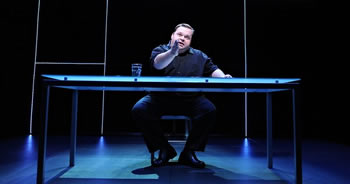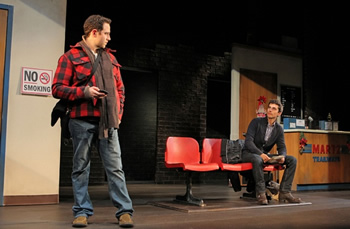HotReview.org Editor's
Picks
Shows Worth Seeing:

The Agony and the Ecstasy of Steve Jobs
By Mike Daisey
Public Theatre
425 Lafayette St.
Box office: (212) 967-7555
The biggest problem with explicitly political theater in this
country is that American audiences really don’t
want to be preached to. We tend to feel personally innocent of
the world’s (and the nation’s) wrongs, and anything
that smacks of didacticism reminds us of church, or synagogue,
and of why we don’t go there anymore. Interestingly, though,
solo performers such as Anna Deavere Smith, Danny Hoch and Mike
Daisey have been remarkably successful at neutralizing this resistance.
They do so by appearing as first-hand witnesses to injustice,
repression, discrimination, and the like—even if they also
impersonate various characters and admit they are “acting”—and
that never-entirely-convincing spectacle of witnessing weakens
the fictional screen that we use to buffer our consciences. It’s
really a neat trick: they create impression of intense one-on-one
encounters that make us feel directly implicated because it’s
as if our talented friends have just returned from harrowing trips
and reported what they’ve seen to us.
The “hard” political subject matter
of Daisey’s new monologue, The Agony and the Ecstasy
of Steve Jobs, is exploitative working conditions in present-day
China: the reality of child labor, low wages, and torturous repetitive
handwork in the mega-sweatshops that manufacture all the electronic
gizmos to which we’re addicted. The “soft” subplot
of the work is that addiction, a consumerist weakness that Daisy
says he shares. He’s been a proud “Apple geek”
for decades, allowing him to buddy up to us as a domestic “witness”
to our susceptibilities before he even starts narrating his eye-opening
trip to the Chinese city of Shenzhen. He poses as a businessman
there to gain access to workers and factory floors at the giant
electronics factories, and he tells us, unforgettably, what he
sees. Daisey’s manner might be described as wacko-sincere.
He just sits at a table with a glass of water, sweating profusely
through his formidable rolls of flesh, and speaks reasonably,
kindly, even gently, except for those moments when he bursts out
into paroxysms of spittle-filled amazement, fury and horror. The
end result is extremely powerful and compelling, not least because,
unlike so much other solo performance, the show is clearly dedicated
to serving an important purpose other than ego-gratification.
-------------------------------

Sons of the Prophet
By Stephen Karam
Laura Pels Theatre
111 W. 46th St.
Box office: 212-719-1300
At first, Sons of the Prophet presents itself as a wacky
boss-from-hell play, as 29-year-old Joseph can’t leave his
office because Gloria, the batty, down-on-her-luck publisher he
works for, keeps haranguing him to write the story of his Lebanese
family because she’s absurdly convinced they’re descended
from the famous poet Khalil Gibran. Then the play seems to morph
into a curiously aimless sit-com, with Joseph and his younger
brother Charles trading lighthearted banter about Gloria, about
the central Pennsylvania town they live in, and the fact that
they’re both gay. Then it morphs yet again, apparently into
a serious morality play that traces the complex poetic justice
behind the sudden death of the brother’s father (in a road
accident caused by a prank) and inexplicable medical symptoms
suffered by Joseph. To Stephen Karam’s enormous credit,
his play turns out to be none of these things. Instead it’s
that rarest of dramatic creatures: a tale of suffering that refuses
all seductions of easy explanation, justification, and comfort.
It’s a lumpy and clunky work, to be sure, but it feels extraordinarily
compassionate in the end because of the way it strives to get
its symptoms right, convincingly drawing the actions and reactions
of a motley group of people who may be occasionally comic, or
self-conscious, or moralistic, but never falsely or contrivedly
so. These people are mainly grasping at survival strategies, just
trying their best to cope with what turn out to be grave matters,
and in that groping and grasping, that ordinary, utterly unheroic
effort to discern a few temporary answers, a few clues on how
to get through one more day, they are moving and even graceful.
This is a decidedly odd drama, with a quirky texture due to its
patchwork ingredients; the voice behind it, brave and powerful,
holds it together.
